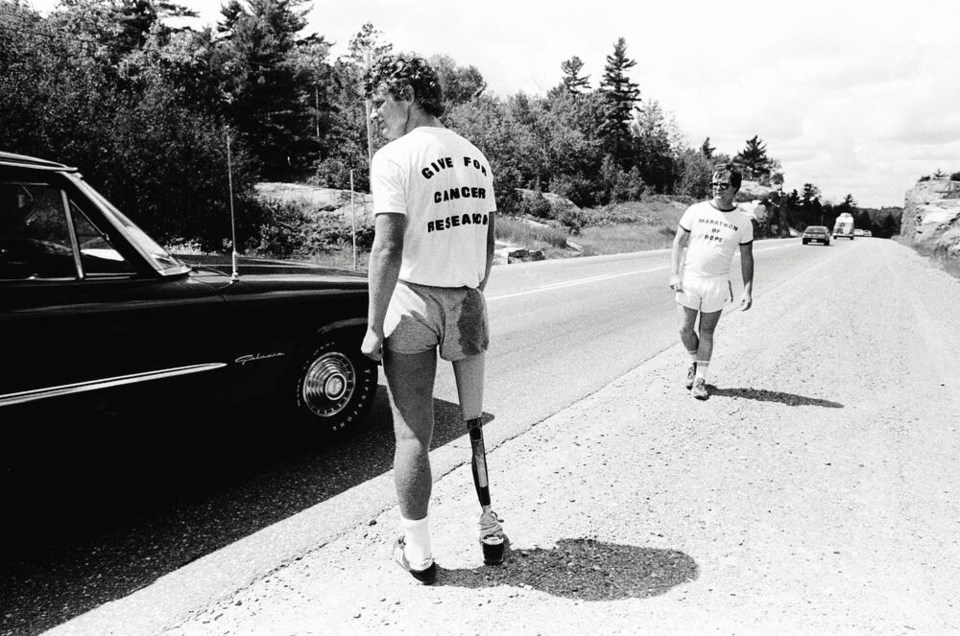Bill Vigars was taking Terry Fox out for a car ride between cancer treatments at Royal Columbian Hospital in New Westminster when Fox turned to Vigars and asked: “Would you like to see where I will be buried?”
It was October of 1980, and Fox had had to end his Marathon of Hope run across Canada the previous month, when the cancer that had cost him a leg began to spread through his body.
Vigars at the time was 33 and working for the Canadian Cancer Society as director of public relations, and had become close to the 22-year-old during Fox’s fundraising run to support cancer research.
He was struck by Fox’s calm demeanour as he faced death.
He recalls the conversation in his newly released book Terry and Me: The Inside Story of Terry Fox’s Marathon of Hope, published by Sutherland House.
Vigars, who will be on hand at Mile 0 on Sunday for this year’s Terry Fox Run, has visited Fox’s grave a number of times since the runner’s death. He said the concrete slab that marks Fox’s final resting place — in Port Coquitlam, not far from where he lived — is always covered with toys.
“I am sure that the image would have brought a smile to his face, because he really loved kids,” said Vigars.
Vigars, now 77, joined the Marathon of Hope from Drummondville, Que. to Thunder Bay, Ont. It was “24/7 for three months,” he said, but it gave him a “first-hand seat at history.” “I saw his wonderful sense of humour, but I also saw him carry the burden of people’s hope on his shoulders.”
He remembers one time when a man came up to Fox to commend him for running on behalf of his son, who also had cancer.
“Where is he?” Fox asked, looking around. “He passed away last week” was the reply.
When Fox was undergoing chemotherapy, he was struck by the young children who were undergoing the same treatments.
“He saw children battling cancer — and not winning,” said Vigars. Helping children became the inspiration for his Marathon of Hope fundraiser for cancer research.
When Fox was asked if it hurt running the equivalent of a marathon a day with only one leg, he replied: “It hurts a lot. But if the pain is too much, I can quit running. But [the children] cannot.”
In most of the pictures of Fox, he is seen running alone. But in the early part of the Marathon of Hope, children would sometimes run with him. Unfortunately, that practice stopped after Fox tripped when a child ran too close to him.
Fox’s Marathon of Hope ended just outside Thunder Bay on Sept. 1, 1980, after 143 days and 5,373 kilometres.
“I didn’t finish the run, but I gave it my best — and all you can do is give it your best,” said Fox.
He had only raised $1.7 million by the time he stopped — short of his $24-million goal, or a dollar from every Canadian at the time.
Fundraising continued while Fox continued to receive treatment for the cancer ravaging his body until the goal was reached.
“I was happy that Terry was alive to realize that his goal had been achieved,” said Vigars.
Fox passed away on June 28, 1981.
The Terry Fox Run, organized by the Terry Fox Foundation, takes place in 650 communities across Canada on Sunday, Sept. 17.
There are no entry fees, but donations are accepted.
In Victoria the five-kilometre route starts at Mile 0 — in Beacon Hill Park at the junction of Dallas Road and Douglas Street — close to the Terry Fox monument — with registration at 9 a.m. and the run taking place at 10 a.m.
The route is open to walkers, runners, cyclists and people on roller blades, in wheelchairs or walking their dogs on a leash.
For more information, go to run.terryfox.ca/28822.
>>> To comment on this article, write a letter to the editor: [email protected]



